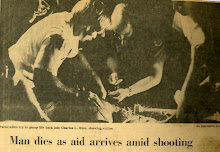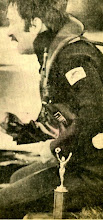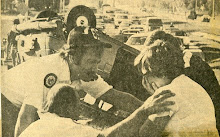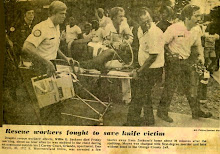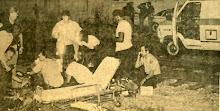Station 7’s nickname to those stationed there was the knife and gun club. It was small of single story cinder block building that was showing it’s age. It served a predominately poor neighbor on the west side of town. It was not unusual for the convenience store next door to be robbed on a reasonably regular basis. On New Years Eve you could walk out on the apparatus floor and listen to the gunfire at midnight as everyone celebrated. Every once in a while the single shots were interrupted by automatic gunfire bursts.
In an attempt to decorate the place in keeping with the neighborhood a large stuffed rattlesnake was kept in the kitchen. One of the guys had left it for the station years ago and it had become a fixture. It sat in a large glass enclosed case on top of the TV. The concertina wire that wound through the fence enhanced our view outside the kitchen window. So the station had it own ambiance about it.
Maybe the easiest way to describe Station 7 is with a story. One night I had just fallen asleep. It was close to three am and we had been busy for most of the day and night. It was the first time I had been able to lay down. I was in that strange place between sleep and consciousness when thought I heard the doorbell to the station ring. It was not unusual for people to walk up and ask for help anytime day or night. I sat up in bed and looked around. No one else was up or awake. Maybe I had just dreamed it. The bell did not ring again, but I thought I should check the front door.
I pulled on my pants and walked to the front door and looked out through the peephole. It was a good one, and gave me the 360 view of outside. There was no one there. I thought I had been dreaming and went back to the dorm and got a couple of hours sleep.
I was the first one up the next morning and opened the bay door to get the paper. I walked out on the apron and pictured paper. It was a beautiful Florida morning. When I turned around I saw on the front door of the station two bloody handprints and a long smear of blood. Oh shit. Another firefighter had come out front too. We both did a frantic search of the bushes for a body, we were afraid what we would find. Nothing. No sign of anyone. Why didn’t the person ring the doorbell again? We could not figure it out. So we washed the blood off the door and went inside to have our morning coffee, just another shift at the knife and gun club.
We were dispatched to an apartment fire. When we arrived we found light smoke coming from a second story apartment. The apartments were concrete block. All of the apartments doors opened to the outside. The second floor apartments doors opened to small balcony that ran the length of the second floor. A metal handrail ran the length of the balcony. I followed the Engine crew up the stairs. We got a whiff of the smoke and knew immediately it was a pot on the stove. There is no other smell like the smell of burnt food mixed with hot metal.
The door was open so we did not have to use forcible entry. When we walked in to find moderate smoke in the apartment. I looked to my right and found a male somewhere in his twenties sound asleep on the couch. He continued to sleep even with all of the noise and commotion going around him. So my partner and I picked him up and carried him out of the smoke filled apartment. He did not move or wake up as we carried him outside.
We laid him carefully down outside the apartment on the balcony. I had turned around to see what needed to be done next when I felt someone grab me by the tank and my coat and try and throw me off the balcony. The victim without saying a word had turned on me. Now no one ever accused me of being skinny. Back then I was somewhere just over two hundred pounds. With my air tank, bunker gear, boots, helmet and other equipment I must have weight close to two seventy. So when he tried to throw me off the balcony I did not budge.
I turned around and wrestled him to the ground. My partner lay across his lower body but he continued to struggle. We were face-to-face rolling around on the balcony with the boot of the Lieutenant off the Engine suddenly appeared. He very carefully but with enough force to make his point bounced the victims head off the concrete.
“Stop it.” He said quietly.
The victim immediately stopped. My partner and I got off of him and let him up. He walked off with ever saying a word.
We received a call for an assault. It was that wonderful three in the morning time when such interesting things seem to happen. Since it was an assault only the rescue respond. We found the apartment complex and wound our way to the building we had been dispatched to. As we came to a stopped we saw a man and woman framed in the headlights. The woman had a knife and was swinging it wilding at the man. He was unusually calm for such a situation. Since we weren’t armed we thought it was not a good idea to get between people with weapons. So I got on the radio.
“Rescue 7 to Orlando. Expedite OPD we have a knife fight going on.”
“Orlando check.”
So we sat there watching this bizarre scene in our headlights. The woman would stop swinging and the man would seem to try and calm her down. But she was not having any of it. She would start swinging the knife again. She never really got near cutting him throughout this whole time. Instead she just swung wildly. Finally OPD arrived. We got out of the truck with the police. The cops seemed to know the two. The cops easily took the knife away from the woman.
“What is going on here?” I asked the male.
“She is trying cut me.”
“I can see that. Are you hurt?”
“Yeah. I am.”
He proceeds to take off his shirt and turn around. He had a long professionally applied bandage on his back.
“When did this happen?” I asked.
“Last night. She cut me last night and I got stitched up at the hospital.”
“But she did not cut you tonight?”
“No. I am fine.”
One of the cops asked.
“Do you want to press charges?”
“No. No I don’t.”
The cops looked at us and we looked at the cops. The cops kept the knife. And we all turned and left them standing in the street. The street has a real sense of humor sometimes.
We received a call for man down in the street. It was the middle of the afternoon and it hardly a time you expect the type of call we would find. When we arrived on the scene we found a large man standing in the middle of the street waving his arms and acting strangely. He was covered in blood and grass stains. There was a crowd around him watching the show. Something was going on here and I did not like it. So I reached for the radio.
“Rescue 7 to Orlando respond OPD to our location.”
My partner Alba had gotten out of the truck and grabbed the trauma and airway kit. He approached the man and said.
“Are you hurt? Can I help you?”
“You know I like your body. But your face has go to go.”
With that he swung and hit Alba in the face with his fist staggering him backwards. I dropped the radio and ran around the front of the truck. Trying to reach the guy before he hit Alba again. As I rounded the front of the truck I did my best imitation of professional football linebacker. I tackled him knocking him away from Alba. I tackled him so hard that when we finally landed we were in the dirt beside the road. We sailed one full lane in the air. We rolled around for a moment until Alba was able to recovery and get over to help me. Our attacker was stunned enough to allow me to reach for my radio. As I straddled the man, I very carefully changed the channel on the radio and said.
“Rescue 7 to Orlando we are in a fight and need help.”
That is all I got out before this guys started to struggle again. It was all Alba and I could do to hold him down. The crowd, thank goodness was enjoying the show instead of deciding to join in on the fun. I hoped that my message had gotten through. I knew they would be there as fast as they could to back us up.
Just then a sheriff deputy arrived. Without hesitation he dove into the melee. We were still struggling when I looked up to see the engine rounding the corner lights flashing and siren blaring. The crew bailed off the truck joined in. We were able to finally subdue the guy. We were all on the ground working to keep the guy calm until the ambulance arrived and we could load him up and get him to the hospital. That is when OPD arrived. Two officers got out of their car and strolled up. With a smirk one of them said.
“You guys need any help.”
They literally had their hands in their pockets. I was afraid to say what I was thinking. I had over the years pulled more than one their officer’s ass out of the fire by helping one of them when they were in a fight and this is how I got repaid. It wasn’t first or last time I ran into this attitude. I will never understand them. Or the way they view the world where even a firefighter is on another side. From then on I called the Slow PD. They never failed to disappoint.
We loaded our friend into the ambulance and sent him to the hospital. I never learned if it was an overdose or he was just crazy that caused him to attack us. Alba went to the hospital he had a black eye and this glasses broken. Me I just got dirty. We were lucky that day it could have been much worse.
We got a call for a man down. It was almost in the same spot where we were attacked. This time we found a male standing and waiting for us. He was holding his exposed penis in a death grip. He faced showed real fear.
“Something crawled up my dick.”
“What?”
“Something crawled up my dick. If I let it go it will crawl higher.”
This was not covered in any training I ever had. We looked at him. Then looked at each other. I could think of nothing that we could do to help him. I had a man once who said something had crawled in his ear. He was in terrible pain. We sent him to the hospital. The ambulance crew told me later that it had been a roach. They had to drown it with alcohol then pull it out piece by piece. No thank you.
“Are you sure?
“Do you want to go to the hospital?” I asked trying not to think of what might have crawled up him penis. All sorts of small insects were coming to mind. None of which made me feel any better.
“Yeah man please.”
That is how we sent him to the hospital. Penis in hand. I never found if there was anything really up there. I am not sure I want to know.
We got a call for a shooting one night. We responded with engine to find a small concrete block home. The police were not on the scene but we decided to go on in. The door to the carport was open and a light was on. We walked up to the door and stood on either side.
“Fire Department.” I yelled.
I stepped through the door first to find a man standing there in his shorts.
“Somebody been shot?” I asked.
“Yeah me.”
“Where?” I did no see any blood and he did not appear to be in shock.
“Here.” He pointed to his penis. Before I could move everyone else had taken a step back. I looked back and could see a couple of them smirking. I knew I was stuck. So I knelt down in front of him and lowered his underwear. A twenty-two caliber bullet fell into my hand.
“Here give this to the cops.” I said and handed it back to the guys.
The victim had a through and through bullet hole through his penis. It was remarkable given how vascular the penis is but there was almost no bleeding, just this bullet hole. So I carefully wrapped the man penis and we sent him to the hospital. The jokes did not stop for quite a while.
